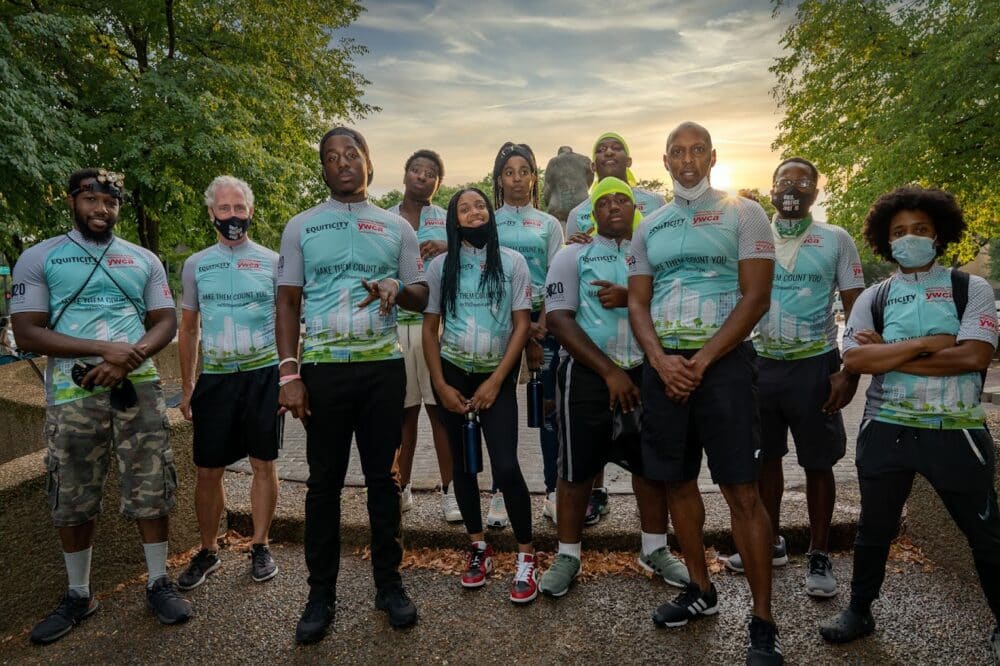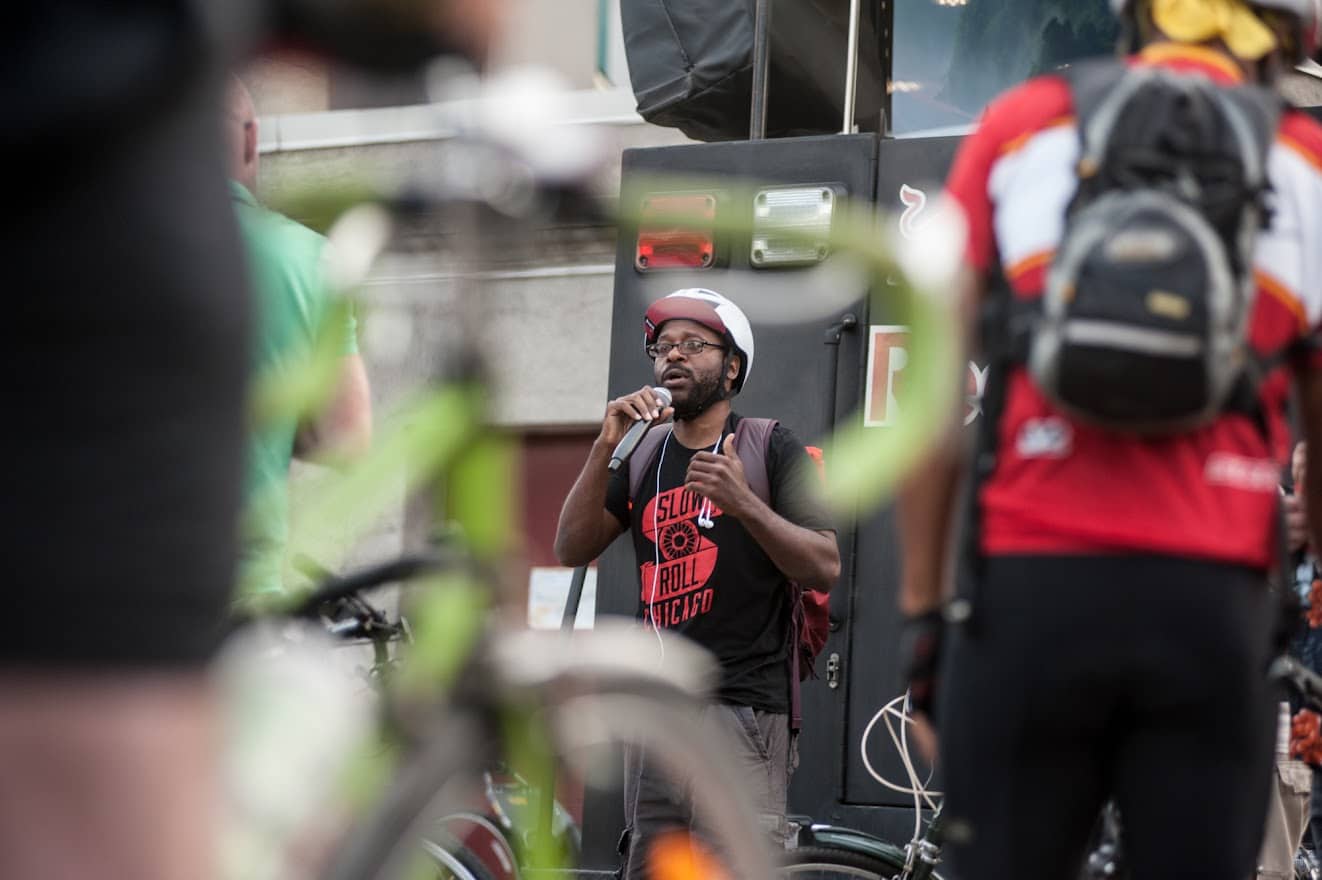*This article is part of a series highlighting the four panelists who are speaking at the 2023 Velo-city conference in Leipzig, Germany on Thursday, May 11th. The panel discussion is titled, “When a Fire Starts to Burn: Creating Community Mobility Rituals to Support Cycling Culture and Drive Policy Change”.
Olatunji Oboi Reed is the founding President and CEO of The Equiticity Racial Equity Movement based in North Lawndale, a westside Chicago neighborhood. He and his team are doing groundbreaking work in advocacy, research, programs, social enterprises and community mobility rituals with an emphasis on racial equity, mobility justice, and building community around all modes of transportation. His journey into this work began with an epiphany early one Saturday morning while riding his bike along the 63rd St. beach path on the southside of Chicago. In fact, it was a bike ride that may have saved his life.
Around the time Oboi was starting high school, he began to experience bouts of depression. He struggled to concentrate in class and experienced other common symptoms of depression but was able to manage them with therapy and medication. He managed it so well that he completed high school and attended Parkland Community College in Champaign, Illinois while his brother Khari was there attending the University of Illinois. During his time in Champaign, he worked in the non-profit sector for a little while and then got a high-level community development job with Bank One (now Chase Bank) back in Chicago. The intensity and stress of this demanding job exacerbated the symptoms of his depression, yet still he was able to manage it. He moved on to a couple of other similarly high-level corporate positions over the next few years until one day he decided he needed to take a medical leave of absence.
Oboi was in a dark, isolated place for a couple of months. His mental and physical health were suffering a great deal and he started asking himself dark questions. Fortunately, he didn’t listen to those dark thoughts and instead chose to ask himself this question,
“Maybe I should take that bike in the basement out for a ride?”
He was a little apprehensive about this idea at first as he didn’t consider himself a cyclist. Regardless, he got the bike tuned up, put it in the trunk of his car and headed to the 63rd St. beach bike trail on the southside of Chicago early one beautiful Saturday morning. Folks were out walking, biking, running and enjoying the sunshine. He mounted his bike and from the first pedal strokes, the impact was immediate. In his words:
“the sound of the leaves blowing in the wind was like a song they were singing to me. The way the sun rays bounced off the water it was like they were playing hide and seek with me. I felt an aura of protection from nature.”
Oboi had found a way to let in the light and overpower the darkness.
People he saw on the trail would give a smile and nod, or say “good morning” and those morsels of social connection fed a deep hunger that nourished his soul. His somatic response to exercising outdoors was undeniably positive and those social graces from the strangers he saw let him know he wasn’t alone in this world. This was the moment when Oboi realized the healing potential that can come from simply riding a bike. Unexpectedly, the bicycle became a tool in his list of strategies to address his depression. This new tool was tremendously potent, and he wanted to share it with his community.

Oboi put the word out to his immediate family and friends and invited them to join him on weekly Saturday morning rides. Eventually, the “Pioneers Bike Club” was born and it was his first taste of advocating for the benefits of riding a bike. He later reached out to a local blogger who wrote about cycling related activities in an effort to get more Black and Brown folks to come ride with the club. People showed up and these social rides quickly reinforced with Oboi the healing potential that comes about when people get together for a bike ride. The addition of music on the rides took it to the next level and that sealed the deal for him. He had discovered a medicine that had unlimited potential for healing and it opened the doors to a new career path.He left his corporate job and immersed himself in local bicycle advocacy. He went on to co-found Slow Roll Chicago, he co-led a couple local of Critical Mass rides and was a co-leader of the Chicago chapter of Red Bike and Green. Now, nearly a decade after this career change, he along with seven amazing, talented staff and dozens of local volunteers are operationalizing transformative racial equity, socio-economic development and mobility justice programming in North Lawndale. Oboi has presented their work to audiences in Brazil, Russia, Mexico, Peru, Colombia, Canada and all over the United States. He knows that the best way to help people understand the power of social rides is through personal experiences, so he often leads social rides in the cities where he’s invited to present. So far, he has led rides in Eugene, OR, Seattle and Spokane, WA and Madison and Milwaukee, WI. He’ll soon add Leipzig, Germany to that list where he’ll be a panelist and co-DJ for the annual “velo parade” at the 2023 Velo-city conference.
On behalf of everyone at Cyclehoop, we’re sincerely grateful for our partnership with Oboi and Equiticity in putting together this panel of folks who are leading the transition to a more just and equitable world. Our collective hope is that those who attend our session feel inspired to create and sustain Community Mobility Rituals in their communities.
Please consider supporting Equiticity’s work by making a donation today!
Read about the other panelists, Curly Bloxks, Freya Scull-Lomax and Najari Smith.

